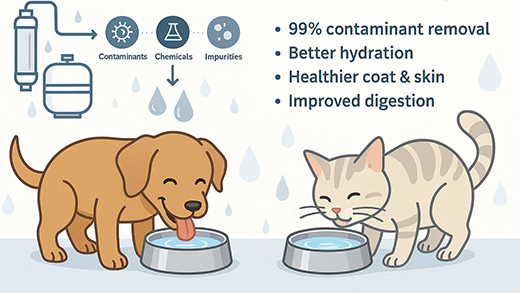Why Your Pet Deserves Reverse Osmosis Water?


We cherish our pets as family—we feed them the best food, give them plenty of love, and try to keep them happy and healthy. But one thing that’s often overlooked is the quality of the water they drink. Not all water is created equal, and some types can even pose serious health risks. Here’s why making the switch to reverse osmosis water could be one of the best decisions you make for your furry companion.
Not all water is safe for pets. Many common sources contain contaminants that can affect your pet’s health over time.
Tap Water:
While treated for human consumption, tap water can contain chlorine, chloramines, heavy metals (like lead and mercury), bacteria, and parasites. These may cause digestive upset, skin irritations, or contribute to long-term organ damage.
Mineral Water:
High in dissolved minerals like calcium and magnesium, mineral water may increase the risk of urinary or kidney stones—especially in cats and small dog breeds.
Caffeinated or Alcoholic Beverages:
Absolutely off-limits. These can cause rapid poisoning, leading to tremors, seizures, organ failure, or worse.
Reverse osmosis water (RO water) is purified through a multi-stage filtration process that removes up to 99% of impurities—including chemicals, viruses, bacteria, and heavy metals. Here’s what makes it an ideal choice for pets:
Clean & Safe:
RO systems effectively filter out harmful contaminants, providing water that’s free from odor, bad taste, and potential toxins.
Encourages Hydration:
Because RO water tastes clean, pets are often more willing to drink regularly—which supports kidney function, digestion, and overall hydration.
Reduces Health Risks:
By avoiding excess minerals and chemicals, you help prevent urinary tract issues, kidney strain, and skin allergies.
Great for Sensitive Pets:
Older animals, those with medical conditions, or pets with delicate immune systems benefit especially from pure reverse osmosis water.
Boiled & Cooled Water:
A decent short-term solution. Boiling helps evaporate chlorine and kill microbes, but it doesn’t remove metals or chemical residues.
Pet-Specific Bottled Water:
Usually safe and tailored to animal needs, but it can be costly and less eco-friendly over time.
Filtered Pitcher Water:
Better than tap water, but most pitchers don’t filter out all contaminants the way an RO system does.
Use a Water Fountain:
Many pets prefer moving water. Consider connecting a pet fountain to an RO system for fresh, filtered flow all day.
Add Natural Flavor:
Stir in a bit of sodium-free broth, or for cats, a teaspoon of water from a tuna can (no salt added).
Keep It Fresh and Clean:
Refresh the water bowl daily and clean it regularly to avoid bacterial buildup.
Place Multiple Bowls:
Especially in multi-pet households, offer several water stations around your home.
Water is vital to your pet’s well-being—impacting everything from energy levels to disease prevention. Choosing reverse osmosis water isn’t just a trend; it’s a smart and caring way to reduce toxins in your pet’s diet and encourage healthy hydration habits.
Whether you invest in an VonWater under-sink RO system or opt for a countertop revse osmosis water filter, you’re making a positive change in your pet’s life—one bowl of water at a time.